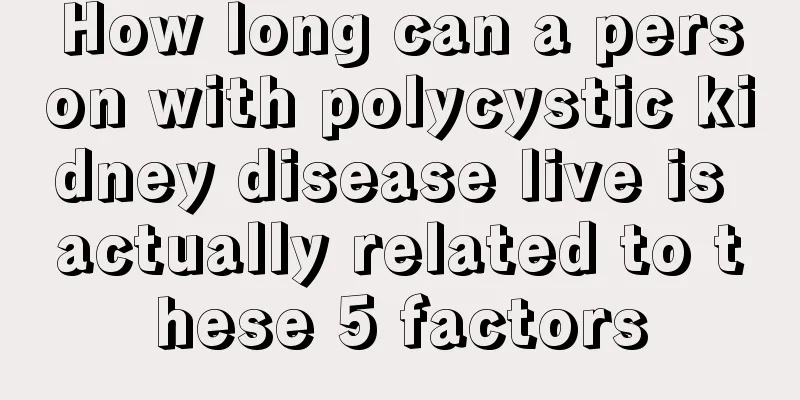How long can a person with polycystic kidney disease live is actually related to these 5 factors

|
Polycystic kidney disease is a relatively common hereditary disease that mostly affects middle-aged and elderly people. However, recently, as the regularity of life of many young people has become increasingly poor, the incidence of this disease has become younger and younger. So how long can you live after suffering from polycystic kidney disease? This issue has always been the most concerned topic for polycystic kidney disease patients. In fact, the survival time of patients with polycystic kidney disease is not a fixed value. It is affected by the following five factors. Experts say that patients with polycystic kidney disease should face up to the disease and actively seek treatment once they are diagnosed with it. Early treatment of polycystic kidney disease is of great help to the survival rate in the later stage. Therefore, if patients with polycystic kidney disease can achieve early detection and early treatment, their lives can be prolonged to the maximum extent. How long can a person with polycystic kidney disease live? It is mainly affected by the following factors. 1. Generally, clinical symptoms begin to appear in adults after the age of 30. The earlier the onset age, the more severe the clinical symptoms, and the later the onset age, the relatively milder the clinical symptoms. Males are more severe than females. 2. After the onset of symptoms, it usually takes an average of more than 10 years for patients to develop renal failure, but there are large individual differences. 3. Adult polycystic kidney disease is characterized by multiple cysts from birth, but many patients never show clinical symptoms and do not develop the disease. Many people are diagnosed with polycystic kidney disease during physical examinations. 4. About 30% of patients with polycystic kidney disease also have polycystic liver disease, but their liver function is normal and they have no symptoms. Cysts may also exist in the spleen, pancreas, lungs, ovaries, etc. About 2% of polycystic kidney patients may develop intracranial vascular malformations and aneurysms, which can easily lead to intracranial hemorrhage. When diagnosed with polycystic kidney disease, patients must receive scientific and effective treatment as soon as possible. Judging from the responses of many patients after surgical treatment, unless it is an emergency, puncture treatment should not be the first choice for renal cysts regardless of their size. One of the reasons is that the cysts have a complete closed capsule. The cyst fluid is secreted by the cyst wall. Puncture can extract the cyst fluid but cannot eliminate the capsule. After puncture, the cyst grows faster due to stimulation. In addition, repeated punctures may cause infection in the cyst and even cause the cyst to become cancerous. Therefore, puncture treatment should never be performed without consideration. On the other hand, for a small number of patients who are suitable for puncture, although puncture can relieve the current pain in a short period of time, the cyst often grows rapidly after puncture. Therefore, it is best to use comprehensive drug treatment after puncture to inhibit the rapid growth of the cyst after puncture. |
<<: This is what polycystic kidney disease with hematuria is all about
>>: Mung bean soup can expel fetal toxins like this
Recommend
What can be seen during anterior rhinoscopy
Anterior rhinoscopy is also a method often used i...
The sleeping posture reveals a person's personality
Sleeping posture can reflect a person's perso...
Remove red blood streaks
Red blood streaks are very easy to appear on the ...
How much does it cost to treat mid- to late-stage pituitary tumors
How much does it cost to treat mid- to late-stage...
Can gastroscopy detect esophageal cancer?
Can gastroscopy detect esophageal cancer? 1. Esop...
Blisters on the wound
If there is a wound on the body, it is easy to de...
What to do if you suddenly have a headache and want to vomit
Nausea and headache are the most common manifesta...
Indications for dialysis
Dialysis is mainly due to the kidneys. Renal dial...
The back of my head feels heavy
Many young people always have a heavy feeling at ...
Is it useful for people with gout to eat baking soda?
The treatment of gout certainly needs to be taken...
What are the symptoms of rectal prolapse
Rectal prolapse is a relatively common clinical s...
Dietary therapy to improve frequent urination in patients with colon cancer after surgery
Colon cancer is a malignant tumor that occurs in ...
How long does it take to complete the plasma transfusion
Many patients with blood diseases need to rely on...
What conditions cause vaginal bleeding
Vaginal bleeding may be caused by a variety of re...
There is a slight pain around the stomach
Stomach pain is very common in life. Generally, s...









